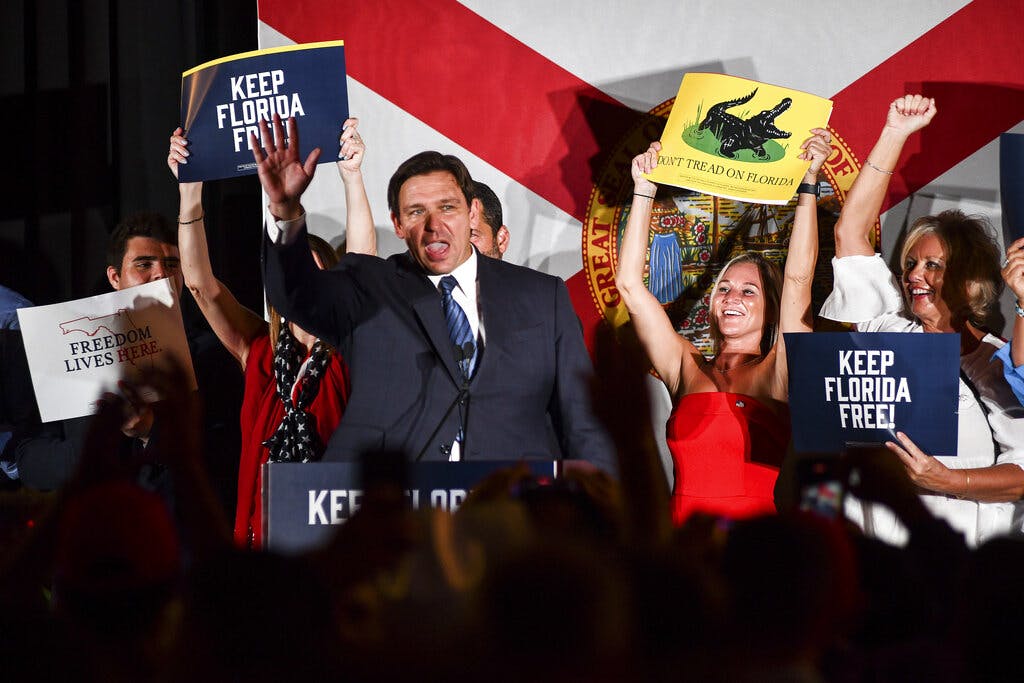Conservative Candidates Clean Up in Florida School Board Races
Several boards saw their political orientation flip entirely, to conservative from liberal-leaning majorities, including Miami-Dade County, the largest in the state and now the largest district in the country to be run by a right-leaning school board.

Conservative voters in Florida sent the strongest signal yet of dissatisfaction with the role of progressive politics in public education, electing most of a slate of local school board candidates endorsed by the Republican governor, Ron DeSantis.
Of the 30 candidates endorsed by Mr. DeSantis, 25 on Tuesday succeeded in their efforts to secure spots on local school boards across the state. Several boards saw their political orientation flip entirely, to conservative from liberal-leaning majorities, including Miami-Dade County, the largest in the state and now the largest district in the country to be run by a right-leaning school board.
The Miami-Dade County school system has more than 300,000 students, and is the fifth-largest in America.
Among the other school boards flipped by voters are those for districts in Sarasota, Clay, Martin and Duval counties. Conservatives also made inroads in eight other districts across the state. Sarasota’s board flipped to a 4-1 conservative majority from a 3-2 liberal one.
Following her victory, Bridget Ziegler, who was re-elected to the Sarasota board, said on Twitter: “The Community has spoken & it is crystal clear – they are demanding a reset of the School Board. And that’s what they are going to get.”
School board seats in Florida are nonpartisan, so the candidates were not identified as Republican or Democrat on the ballots. Four candidates endorsed by the governor will have to campaign in runoff elections.
Most of the candidates were also endorsed by the 1776 Project political action committee, which was formed to promote candidates opposed to racial and gender ideology in public schools. The committee has said it intends to expand its efforts beyond Florida and target school board races across the country during the November general election.
Election night was not, however, a total loss for Democrat-backed candidates, who energized their base by attacking Mr. DeSantis’s heavy-handed tactics in the education debate. In Hillsborough County, which covers part of the Tampa Bay area, the DeSantis-backed Moms for Liberty candidate, Alysha Legge, was unable to unseat Karen Perez, who enjoyed the support of Charlie Crist, who prevailed over Nikki Fried to become the Democratic gubernatorial candidate in November.
In Gainesville, the Democrats’ chosen candidate for the Alachua County school board, Diyonne McGraw, beat Mildred Russell, who Mr. DeSantis installed on the board last year after it emerged that Ms. McGraw did not live in the district.
Mr. DeSantis, unusually for a governor, campaigned aggressively for his chosen candidates, embarking on a statewide tour on their behalf in the weeks before the election, and pouring hundreds of thousands of dollars into the races. On election day, he said on Twitter that the races were crucial to keeping his education agenda alive in the state.
“Florida has led with purpose and conviction that our school system is about education, not indoctrination,” he said. “These 30 candidates are committed to the student-first principles of the DeSantis Education Agenda.”
That agenda, which Mr. DeSantis and his supporters call “pro-parent,” is focused on eliminating explicitly progressive politics — “woke ideology,” in the words of the governor — in public schools. He has also focused on curriculum transparency, opposing Covid-related lockdowns, enhanced civics education, and increasing teacher pay.
In March, Mr. DeSantis came under fire from progressive voices across the country for signing the Parental Rights in Education bill, which banned classroom instruction in gender ideology or sexual orientation in kindergarten through third grade. Critics of the legislation dubbed it the “Dont Say Gay” bill, and have challenged it in court as a violation of the First Amendment.
The effort in Florida followed a similar, though less aggressive, strategy to the one employed by Governor Youngkin in Virginia, whose 2021 victory was widely credited to his outspoken support of parents’ rights vis-a-vis education policy and transparency in public school programs.

